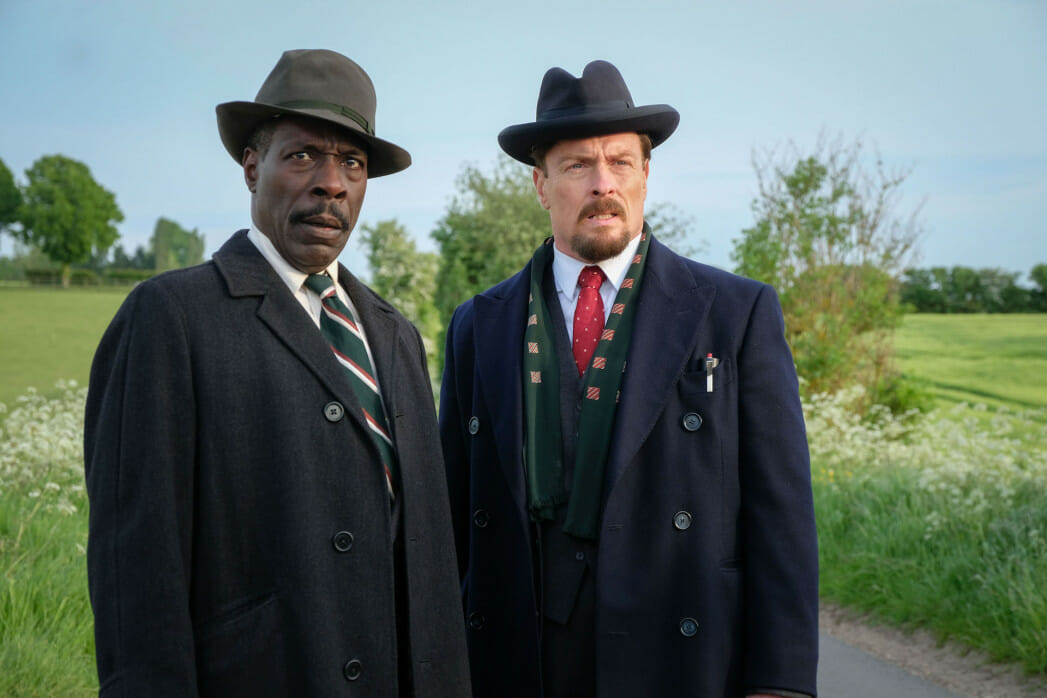
10 January 2020
The real-life spy drama behind Summer of Rockets
Summer of Rockets, the semi-autobiographical BBC mini-series from Emmy and BAFTA nominated writer-director Stephen Poliakoff (Perfect Strangers), is now streaming first on Showmax.
Listed among The Week’s Best TV of 2019, the six-part series has an 88% critics rating on Rotten Tomatoes and was praised by The Times for its “sumptuous cast”, “cracking dialogue” and “gorgeous” visuals.
Part period drama, part spy thriller, Summer of Rockets is set against the backdrop of British high-society in the late 50s, at the height of the Cold War. The series follows Samuel Petrukhin, a Russian Jewish inventor of hearing aids, whose latest invention, a “staff locator” (aka pager) for hospitals, is struggling to find a market, but earning Samuel plenty of unwanted attention from sinister men in dark coats, who seem to be following him. Determined to position his family among the British elite, Samuel is dismayed when MI5 approaches him to undertake a secret mission – spying on his influential new friends, the Shaws.
Samuel has succeeded in arranging a prestigious boarding school for his young son Sascha, and etiquette classes for his 17-year-old daughter Hanna ahead of a formal introduction to the Queen. But his own dreams and ambitions prove far removed from his children’s experiences in a society poised between tradition and upheaval.
Toby Stephens (Black Sails’ Captain Flint) leads a formidable ensemble cast that includes Oscar nominee Peter Firth (Victoria), BAFTA winner Mark Bonnar (Unforgotten); and BAFTA nominees Keely Hawes (Bodyguard), Linus Roache (Vikings), and Timothy Spall (Harry Potter), whose performance RadioTimes describes as “spectacularly sinister.” Also look out for South African actress Suanne Braun.
Poliakoff – called “one of British TV drama’s great outsiders” by The Herald – fills us in on the real-life events that inspired the series.
“Most surreally, being suspected by the Secret Service of bugging Winston Churchill’s hearing aid – that’s all true.”
Stephen Poliakoff
What was so significant about 1958 as a setting for this story?
1958 was an extraordinary year. It saw the end of the debutantes being presented to the Queen. It was also a time of great fear of nuclear war. The Cold War was at its absolute height and (the year) ended with the Notting Hill riots – a reminder of the racial tensions that were bubbling up. All these things came together within a few weeks in the summer of 1958.
Tell us a bit about the characters in the series.
Summer of Rockets centres around a family – modelled closely on my own – that gradually gets caught up in the tensions of the Cold War. We follow Samuel, who finds himself caught up with the Secret Service and involved in the mystery that he has to try to solve. Hannah, his daughter, is desperately trying to find her own identity and having to do this grizzly [debutante] season. Sascha, the little boy, is sent off to an austere and frightening boarding school, just as I was.
How much does it draw on your own experiences and your family history?
The story is fiction, but it has many elements that are true. Samuel’s firm, the invention of the pager, the use of deaf workers and, most surreally, being suspected by the Secret Service of bugging Winston Churchill’s hearing aid – that’s all true.
So Samuel, and his company, that’s based on your father?
My father (together with my grandfather) invented the pager for St Thomas’s Hospital in the late 1950s, having witnessed the method by which doctors were then summoned: a chaotic mixture of bells and frantic tannoy announcements. Their invention, though adopted by one or two other hospitals, was thought too revolutionary for government departments or for industry (and certainly for the general public) and they struggled to avoid bankruptcy for many years.
But they did manage to come under suspicion by the Secret Service?
My father’s firm also made hearing aids, and one of their customers was Winston Churchill. My father serviced Churchill’s hearing aid when he was Prime Minister, during his second premiership, and this entailed several visits to see him at No.10. The Secret Service became suspicious of a Russian having such access to No.10 and the Prime Minister. My father and grandfather were put under surveillance.
The head of MI5, Roger Hollis, wrote to Churchill’s private secretary recommending that my father and grandfather should be prevented from continuing to service Churchill’s hearing aid in case they had turned his hearing aid into a bugging device and were somehow listening in to all the secrets of the cabinet room. My father and grandfather were promptly denied all access to Churchill and No. 10. They continued to be under surveillance for a period in case they were judged to be enemies of the state.
Are there elements to the story that you feel makes it particularly relevant right now?
When you make a period drama, you are conscious that you must speak to a modern audience and that there may be resonances. The most important is the fear of Russian penetration, which dominates the story of Summer of Rockets, but also dominates us now. But also the sense of technology exploding… These are all very urgent concerns for us at the moment and they’re all contained in the summer that these characters lived through.
Original African stories by local talent

The ABC Killer
The ABC Killer is a twisty true-crime documentary series about serial killer Moses Sithole. Stream from 22 July on Showmax.

What if we believed the best can come from here?
Let’s rewrite the rules of what it means to be local.

Untied S1
Untied explores the deeply personal and often complex experience of divorce, told through the voices of women who have lived it. Stream now, with new episodes every Tuesday.

Reckless S1
Reckless follows a pair of young brothers who find themselves at a crossroads when a tragic accident changes their lives forever. Stream now, with new episodes every Monday and Tuesday.

The Mommy Club NBO
The Mommy Club NBO is the fifth instalment of the record-breaking Mommy Club franchise. Stream now, with new episodes every Friday.

Empini S1-2
Empini is a high-stakes, action-packed drama set in the ruthless, corrupt world of private security. Season 2 is now streaming, with new episodes every Tuesday.

Youngins S1-2
Stream Tshedza Pictures’s first teen drama, Showmax Original Youngins. S1 and S2 are ready to binge.

The Real Housewives of Durban Seasons 1-5
Our eThekwini queens are back with a brand-new season. Stream Season 1-5 now, with part one of the reunion now streaming and part 2 landing on 11 July 2025.
SA celebs open up about divorce on Untied
The action heats up on Empini
More Mzansi gold

The Mommy Club: Van Die Hoofstad S1
Stream the reunion of the hit Showmax Original reality show, featuring five dynamic, wealthy women from Pretoria as they manage relationships, families, businesses, and busy social lives, on 27 June and 4 July 2025.

Eye-opening homegrown documentaries to stream
These unmissable South African shows and movies deliver surprising insights on the country we’re living in today.

20+ addictive South African reality shows to stream
Stream The Catch, The Real Housewives of Durban, The Mommy Club, and more of South Africa’s best reality shows on Showmax.

MaBlerh returns to host The Real Housewives of Durban reunion
MaBlerh returns to host The Real Housewives of Durban reunion for the third year in a row. The Season 5 reunion drops in two parts on 4 July and 11 July 2025.
